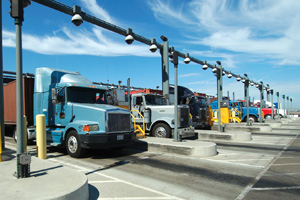Supreme Court Hears ATA’s Case Against Port of L.A.’s ‘Clean Truck’ Program

Attorneys for American Trucking Associations and the Port of Los Angeles squared off in the U.S. Supreme Court over several requirements included in the port’s “clean truck” concession agreement with drayage operators.
The high court agreed to hear the oral arguments to weigh evidence related to two of three major questions raised in ATA’s December 2011 appeal after a federal appeals court struck down a ban on independent owner-operators from servicing the port, while leaving the concession requirements in place.
Washington attorney Daniel Lerman, arguing on ATA’s behalf, told the justices that the port was using its “full coercive power” to impose conditions on motor carriers in direct violation of the Federal Aviation Administration Authorization Act.
That law, he said, prohibits state and local governments from enacting or enforcing any “law, regulation, or provision having the force and effect of law related to a price, route, or service of any motor carrier.”
“Congress sought to prevent state actions that impede the free flow of trade or that would result in a patchwork of requirements from jurisdiction to jurisdiction,” Lerman said. “If these rules are allowed to stand, it would clear the way for a patchwork of regulations that would lead to unreasonable burdens on the movement of goods.”
The port’s attorney, Steven Rosenthal of Washington, argued that because the port is a business enterprise, it had the right to require drayage operators to submit off-street parking plans, properly maintain their trucks, post placards on permitted trucks and demonstrate financial responsibility as part of its overall clean trucks plan.
The port “undertook these actions as a reasonable and genuine response to the needs to build and grow a port,” Rosenthal said. “We submit you cannot be the owner-proprietor of property without having some control over the conditions under which . . . business invitees come onto your property.”




